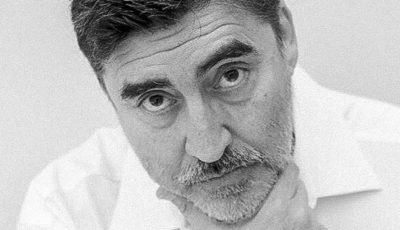

AudioFile Spotlight: Behind the Mic with Actor Alfred Molina
We spoke with renowned actor Alfred Molina about his work on audiobooks, including the new full-cast audio adaptation of Agatha Christie’s THE MURDER ON THE LINKS, and more. This is an excerpt—hear the full conversation in a bonus episode of AudioFile’s podcast, “Behind the Mic with AudioFile Magazine.” (https://audiofilemagazine.com/podcast/)
You’re an actor of amazing versatility in terms of the range of characters you play and the genres in which you perform. You perform on stage, in film, on TV, and you record audiobooks. How do you choose what projects to take on?
Well, I wish I could tell you that this was the result of some fantastic game plan that I concocted when I was a young man or anything like that, or that I’ve been following some sort of plan. But the truth is, I basically said yes to everything, and from when I started acting professionally, when I was what, 19, 20, my big priority was always to be employed, to earn a living.
And I think I got that from my parents, who were both immigrants from southern Europe to England. My father was a waiter and a maître d’. My mother cleaned hotel rooms and eventually became what we used to call a linen keeper. And that was their world, and it was all about working, making a living. They had a typical immigrant sort of notion about this is how we better ourselves and create a better life for our kids.
And I just remember, going into a profession that was seen by so many people, including my parents, as being very insecure, I just thought, I’ll have to go to work. Any job that was offered, I said yes to, and I’ve been doing that all my life.
And now after 45 years as a professional actor, I look back on what I laughingly regard as my career, and what I see is this kind of crazy quilt of all kinds of different things—there’s no discernible pattern. It’s kind of chaotic, but what it has done is it’s given me a wonderful range of stuff that I’ve been able to do, and also, it’s let people know along the way that, oh yeah, you know, Fred’s game for this. But I like the way it’s turned out because I like the fact that I can go from a TV job to a little film job to a theater play, to a radio play or to reading a story. This is my profession, this is my skill, and to be able to practice that skill in as many different ways as possible is a pleasure, and, I’m very aware, a real privilege.
You’re known for your facility with accents and with languages. You’re good not just with the accents themselves but also with the rhythms of language. What kind of preparation do you do?
Some of it is work on my part. Not a great deal, I have to be honest. But I think a big part of that is that I was blessed with a good ear, and I think that also comes from my parents because both my parents left school in their respective countries by the time they were about 15 or 16. They had a high school education. My father was already working by the time he was 14. But they both, interestingly, had fantastic facility for languages. My mother already spoke French when she came to England. By the time the war was over and he had become a naturalized Briton, my father already spoke his own language, Spanish. He spoke English. He also spoke a little bit of German and a little bit of Arabic, incredibly. My mother learned Spanish from my father. They learned English together. My parents were fluent in four languages, each of them. They learned English by living there and working. My parents’ English was full of wonderful slang and colloquial language.
I grew up in an atmosphere where that was accessible; that was all there for me. I wish I could say it’s due to diligent study on my part, but I think a lot of it is just a happy set of circumstances.
You’re acting on stage; you’re in film. When did you add audiobooks to your quiver?
Many, many years ago, back in the UK, I recorded, it was either a book or a set of short stories. I remember going into this booth. I sat down. I had the script in front of me. The engineer gave me some dos and don’ts, you know? And because I’d done some radio, I knew enough already that there was that old trick of pausing, turn the page, let the paper settle before you start again. I remember thinking, looking at the script and thinking, “oh, how convenient. The last word on every page is the end of a sentence. How convenient.” Not thinking for a moment that somebody had been working very hard to make sure that was the case.
There’s something rather elegant about doing voice work when you’re recording a novel or a story. It’s as if you have an intimate permission to enter this world. When you read a novel for audio, you’re not becoming the writer exactly, but you are certainly the center of the book. Whatever you bring to the book, whatever mood you’re in, however the book hits you, you’re reflecting that in the reading, in the recording. And it becomes a very intimate thing. You’re also physically close to the microphone. Very often for effect, you might bring your voice down really low for something, or you might lean back and give it a bit more belt.
It’s not just reading a book; it’s performing a book, and that’s what I found really exciting. There’s nothing between you and the audience. You have a direct link with the audience, and that’s why I love it so much. I think my favorite thing I did was, I did a whole bunch of books by Larry McMurtry, the Berrybender chronicles, about four books. We did that over a period of a couple of years, and that was just amazing. Something like 35 different characters, different voices, different accents. It was so much fun, so much fun.
Mystery & Suspense Audiobooks for October from AudioFile Magazine
The long shadows and chilly nights of October beg for the comfort of a fall mystery. AudioFile editors have five audiobooks recommended for listeners. Craig Johnson offers us the 17th episode with Montana Sheriff Walt Longmire. Megan Abbott brings us a thriller that may be a seasonal classic. And for a setting that mystery readers don’t get often—Mexico in the 1970s is the locale of Silvia Moreno-Garcia’s twisty thriller.
By Craig Johnson | Read by George Guidall
Recorded Books | 8.5 hrs.
Winner of AudioFile Earphones Award
Narrator George Guidall performs Book 17 in the Sheriff Walt Longmire series with all of his masterful storytelling talent on display. The sheriff and his partner-in-justice, Henry Standing Bear, are requested by Tribal Police Chief Lola Long to investigate death threats being sent to her niece, Jaya, a talented high school basketball player. The story draws listeners’ attention to the real-life tragedy of missing and murdered Indigenous women and girls. Guidall’s deep voice lures listeners into a mystical subplot woven throughout. A standout in the series for story and performance.
By Louise Candlish | Read by Steven Mackintosh
Simon & Schuster Audio | 10.75 hrs.
Winner of AudioFile Earphones Award
Nothing is exactly what it seems in Louise Candlish’s expertly plotted mystery. Narrator Steven Mackintosh offers up a chilling performance as Jamie Buckby. Jamie and Claire live well on Claire’s income. Due to extreme claustrophobia, Jamie commutes to work by boat. He begins a friendship of a sort with fellow commuter Kit. When Kit disappears, Jamie suddenly finds himself the focus of a police investigation. When things heat up, you can almost hear Jamie’s heart pounding in Mackintosh’s voice. Candlish brings extraordinary psychological insights into play, and Mackintosh delivers the emotions.
By Megan Abbott | Read by Cassandra Campbell
Penguin Audio | 11.75 hrs.
Winner of AudioFile Earphones Award
Rarely will listeners find a dark contemporary fiction so exquisitely narrated that it becomes an instant classic. Cassandra Campbell portrays the story of two sisters, Dara and Marie, who continue the legacy of the Durant School of Dance, started by their mother. Approaching the annual performance of The Nutcracker, the Durants hire a contractor, Derek, who becomes Marie’s unhealthy obsession. Campbell vividly captures the paranoia, the world of ballet, and family secrets. All this paired with gut-wrenching twists and reveals spirals into a perfect storm that listeners will relish.
By Michael Sears | Read by Richard Poe
Recorded Books | 12.25 hrs.
Winner of AudioFile Earphones Award
Richard Poe commendably presents Queens, New York, with its cross section of cultures and residents, including one-time top lawyer—now foreclosure profiteer—Ted Molloy. Listeners will enjoy the action as Molloy tackles real estate moguls and Russian mafia between visits to Mets home games and Gallagher’s Pub. Splendidly rendered descriptions of the locale, people, and food add texture, while snippets of Molloy’s life add dimension and levity. Poe’s superb delivery, including his ability to deliver multiple accents, enhances the story’s fascinating personalities.
By Silvia Moreno-Garcia | Read by Gisela Chípe
Random House Audio | 10 hrs.
Winner of AudioFile Earphones Award
Narrator Gisela Chípe successfully juggles the many characters and subplots in this exciting, odd (in a good way) mystery set in 1970s Mexico. The government underwrites a group of thugs to do whatever’s necessary to keep down student protests and civil unrest. Chípe delivers a perfect Maite, a bored 30-year-old secretary with a Walter Mitty dream life inspired by her favorite magazine, Secret Romance. An artful narration by Chípe and an ingeniously plotted thriller by Moreno-Garcia (Mexican Gothic) make this prime listening.
- MARS, THE BAND MAN, AND SARA SUE with L. Marie Wood - May 3, 2024
- HITCHHIKER with Vincent Zandri - May 3, 2024
- JIM AND KATHERINE with Traci Hunter Abramson - May 3, 2024






